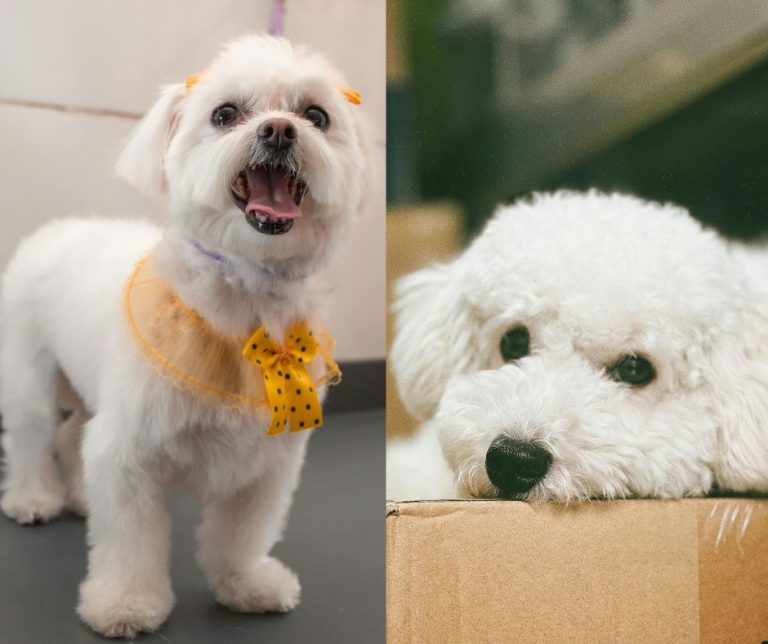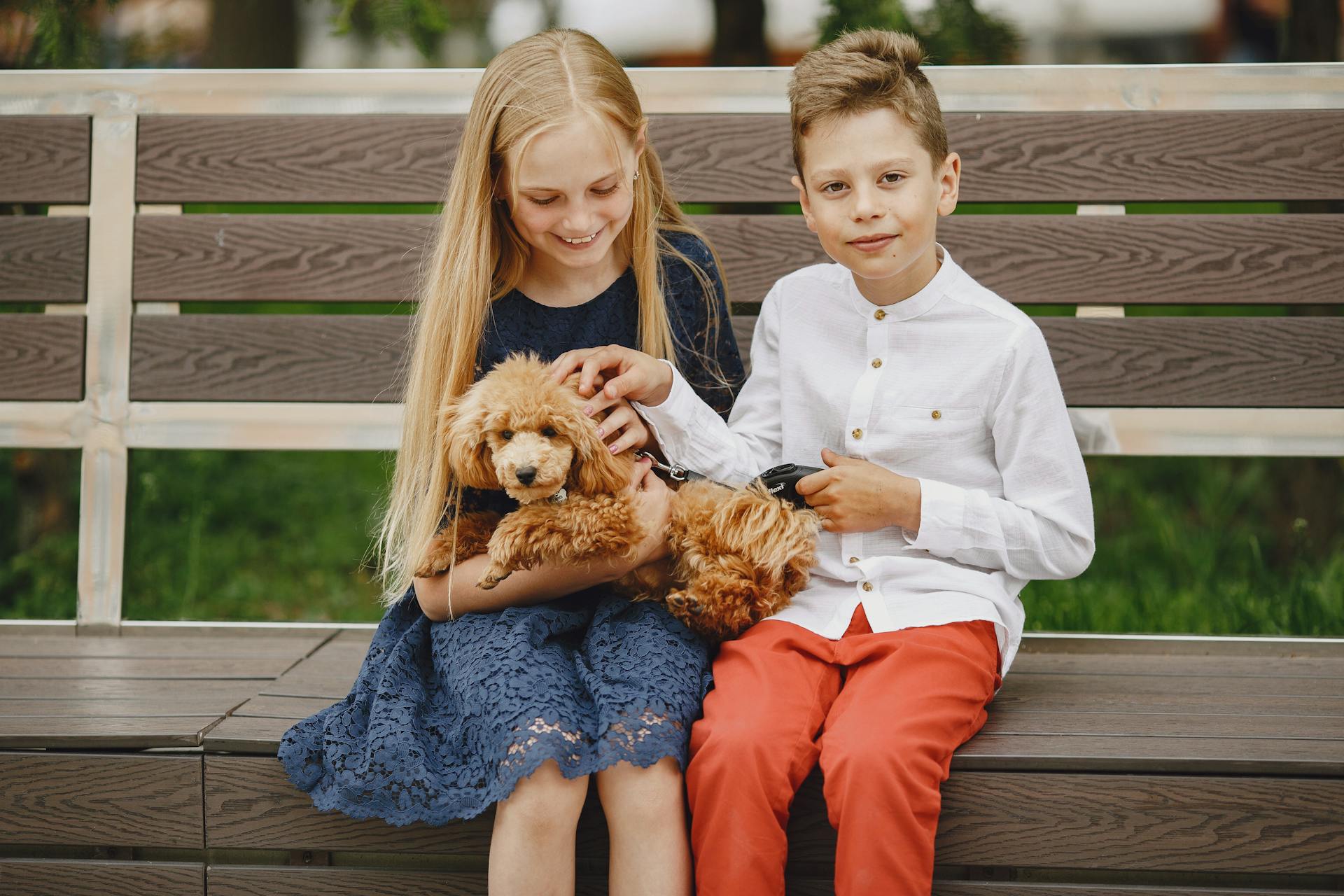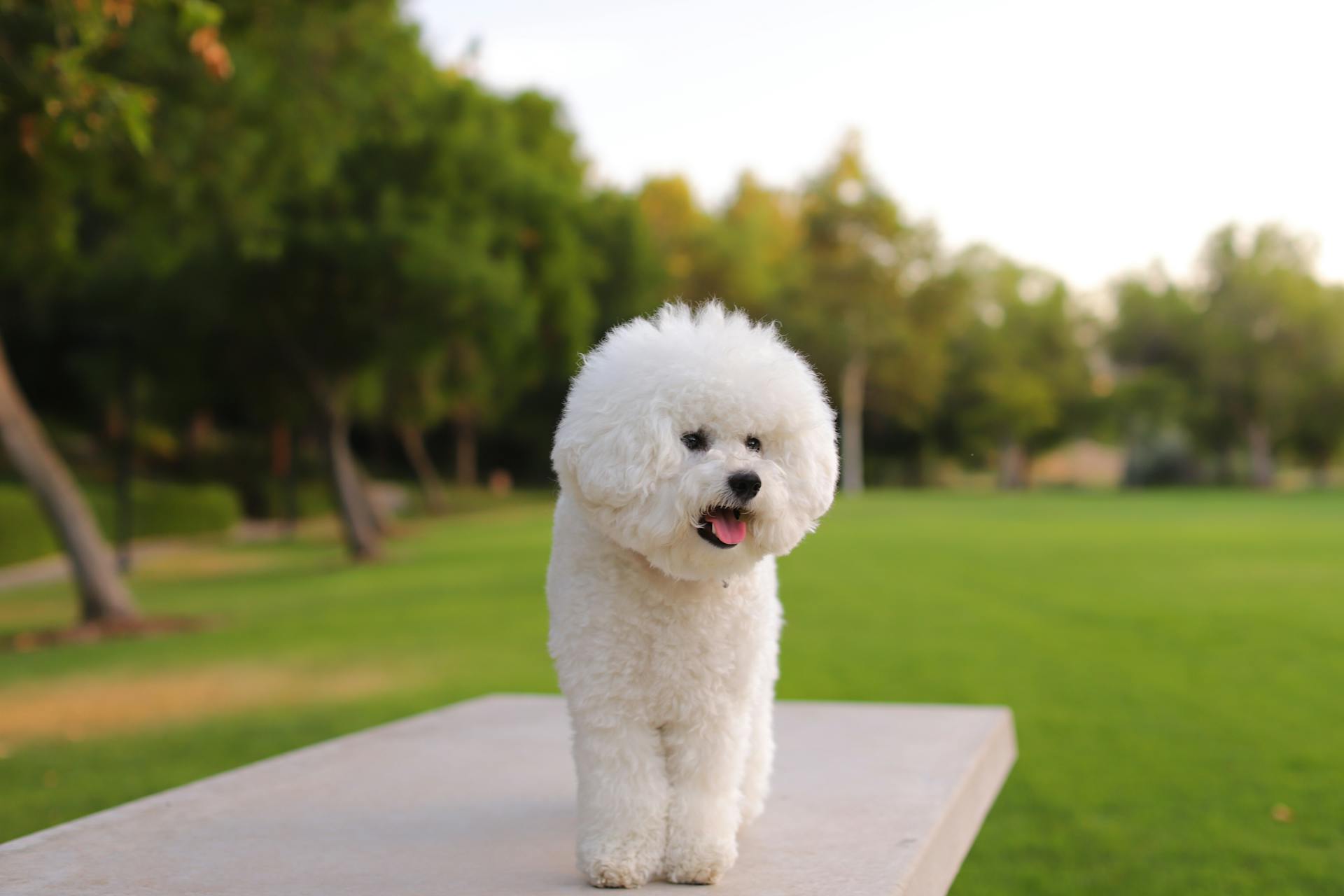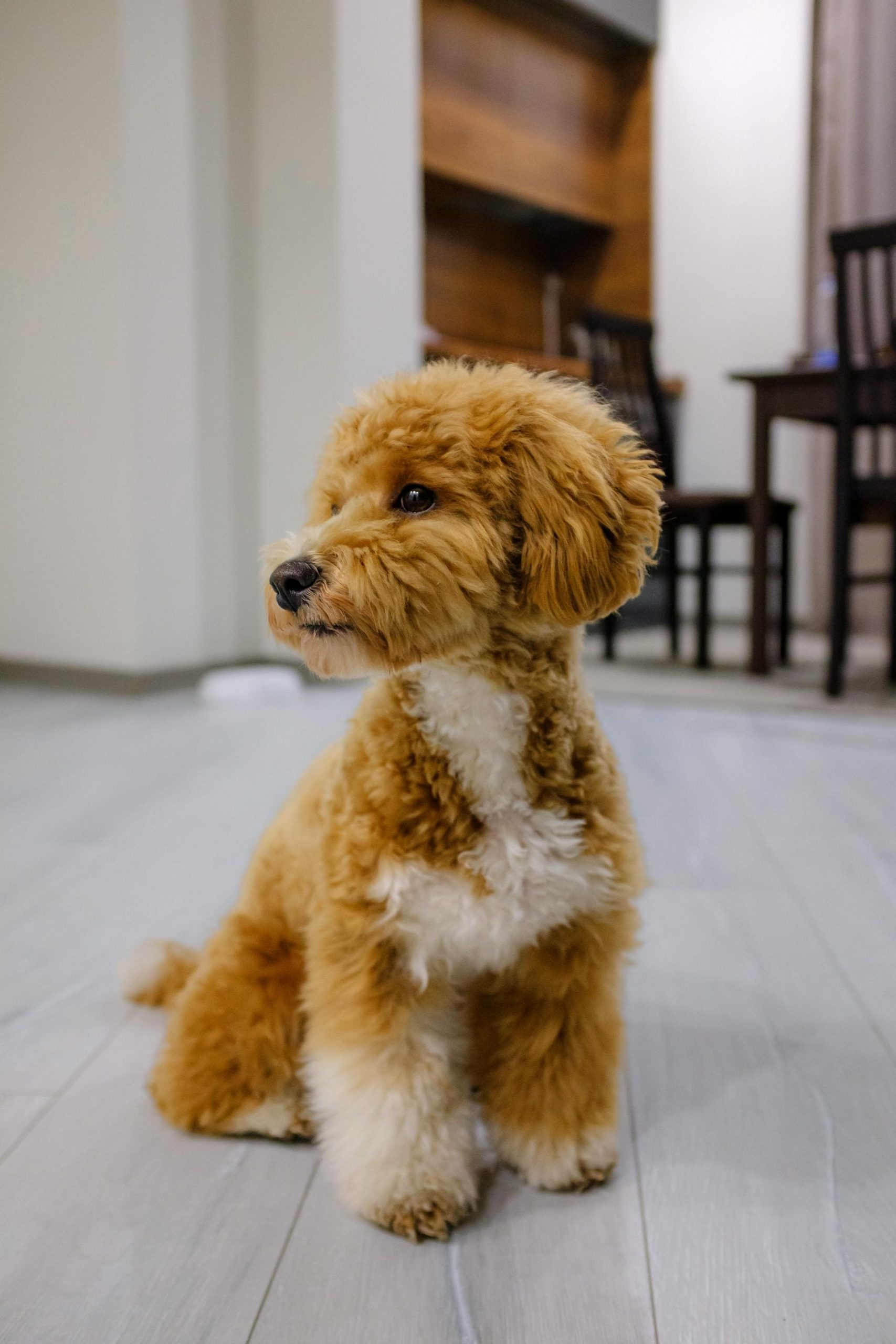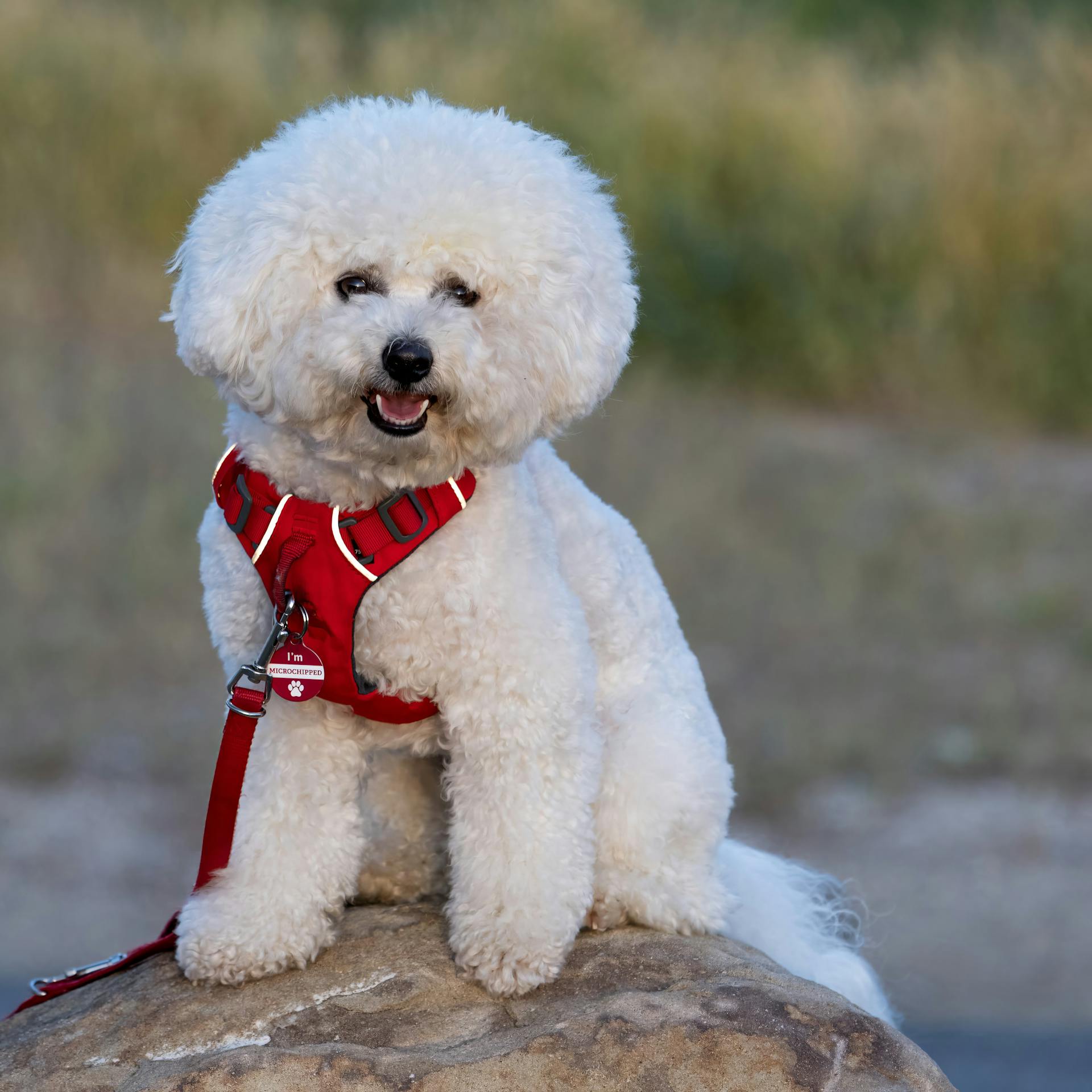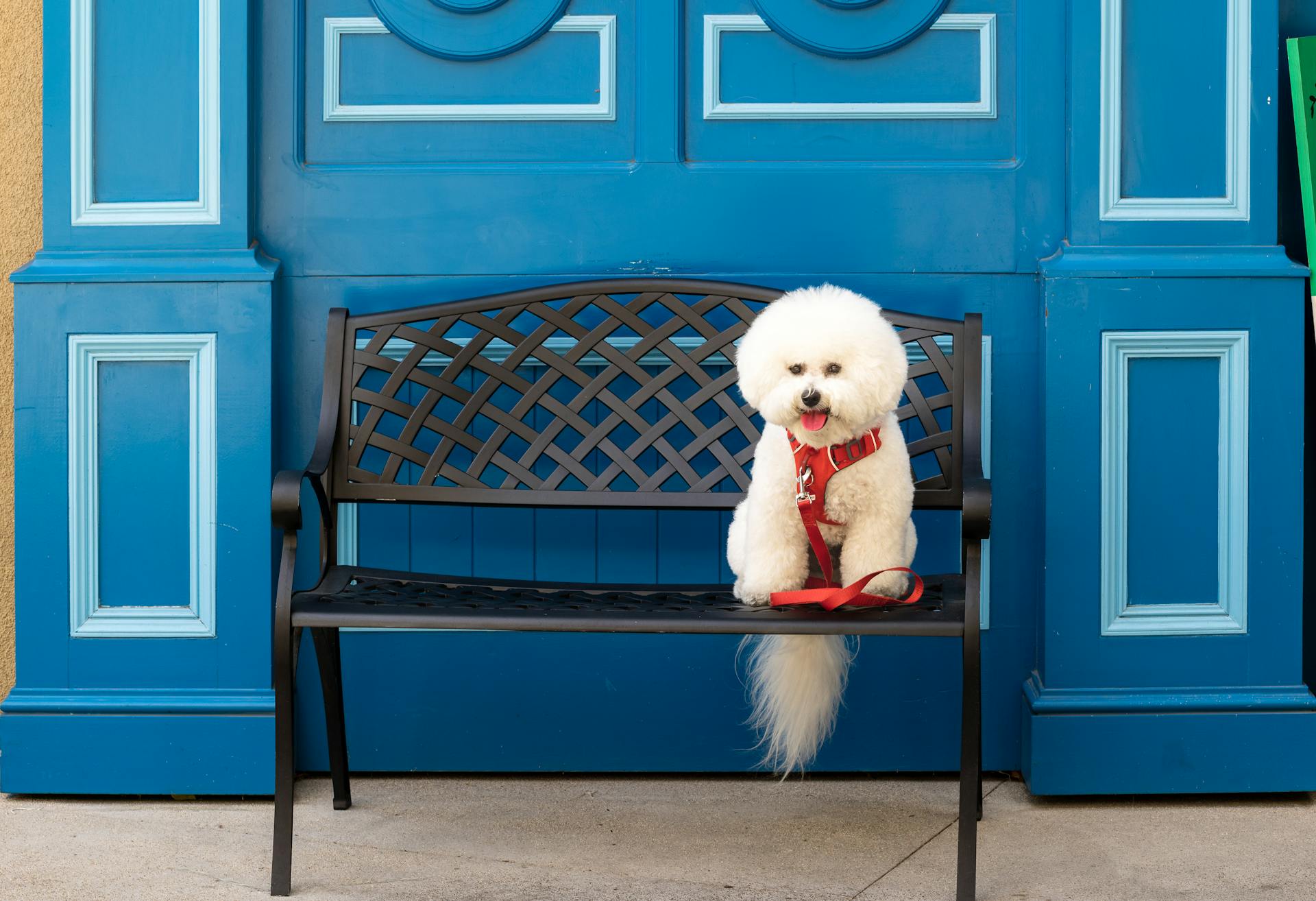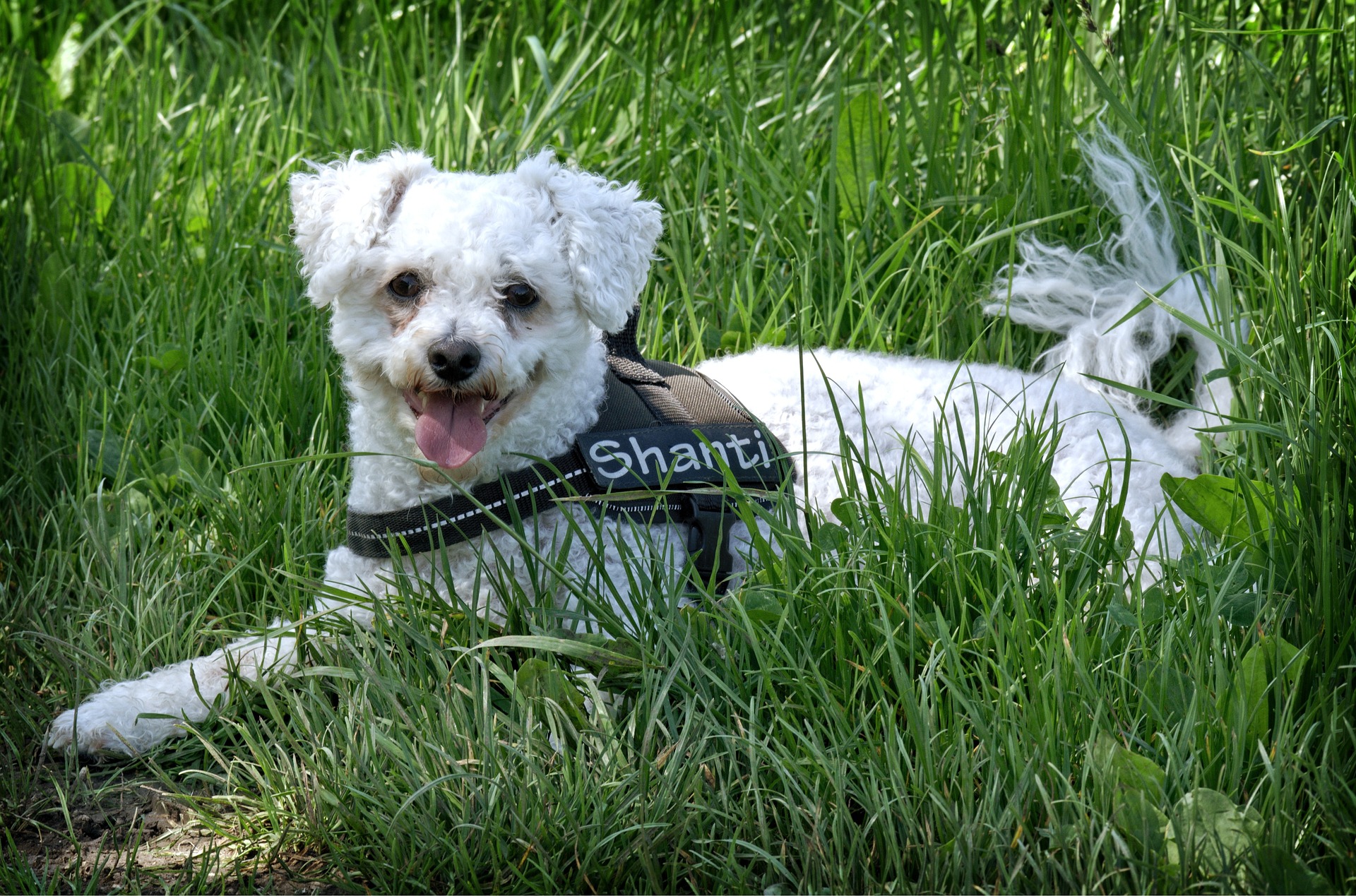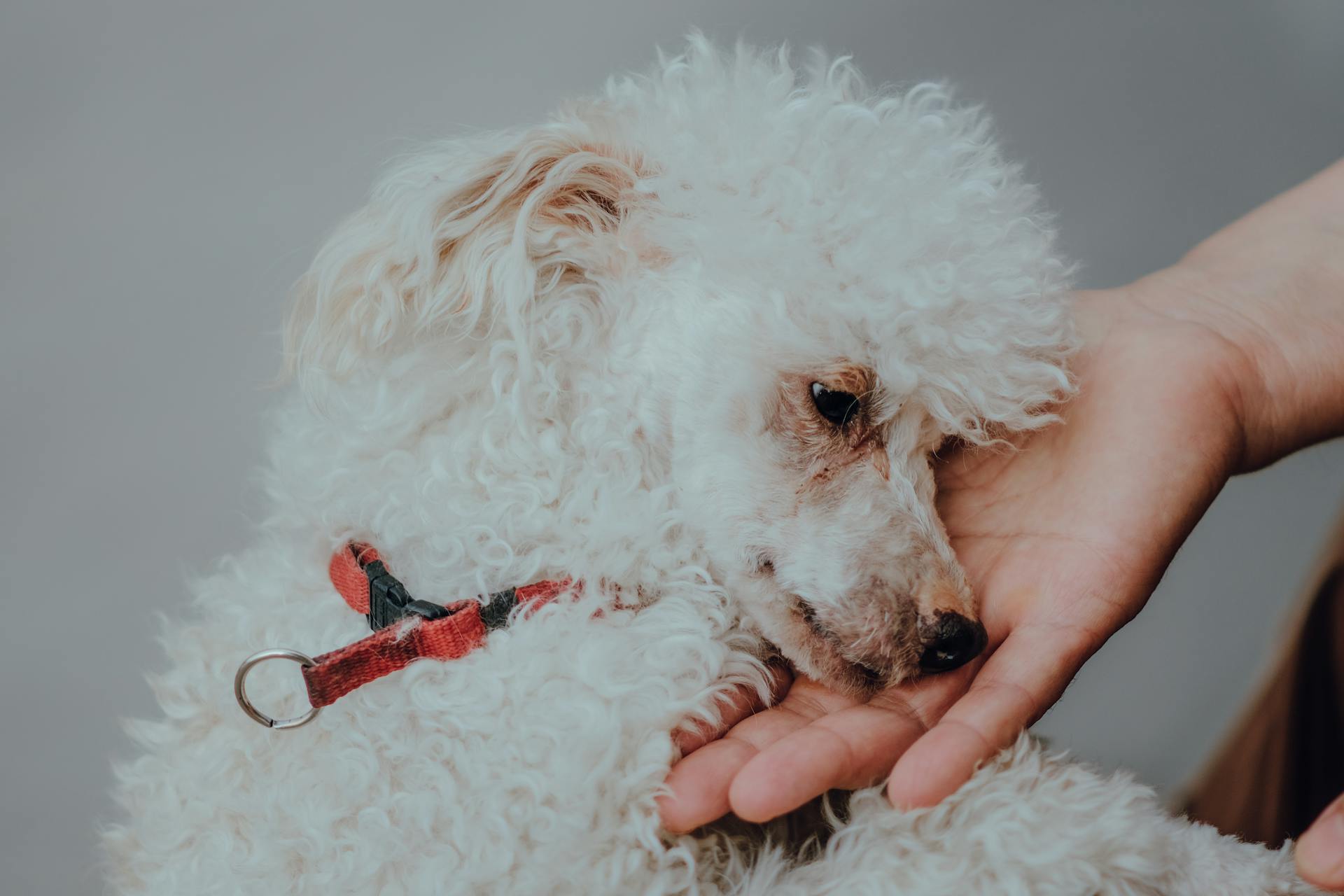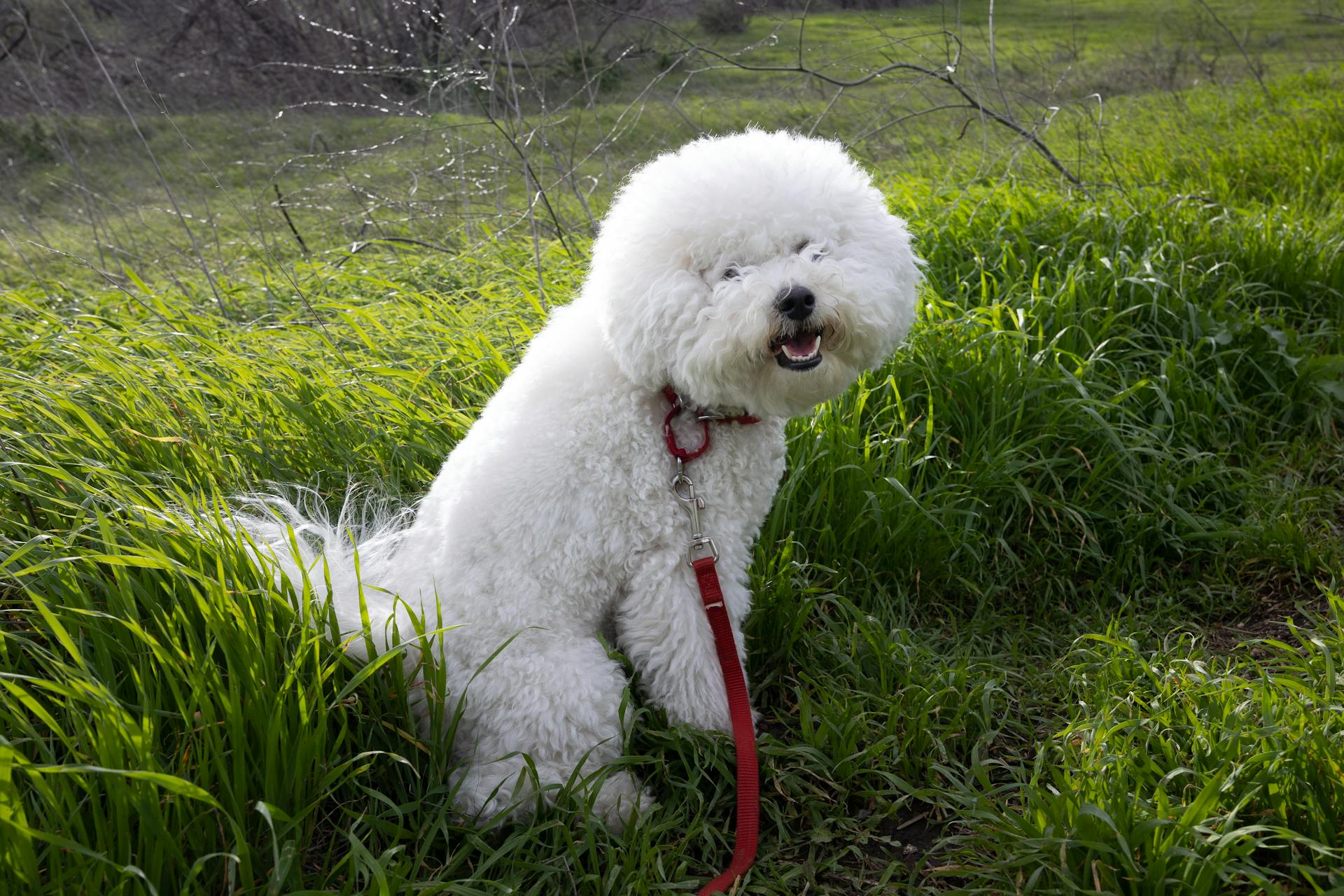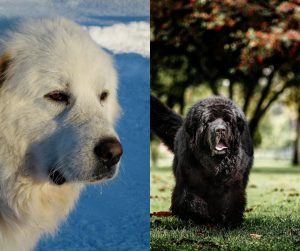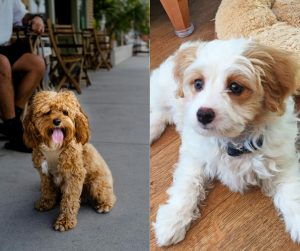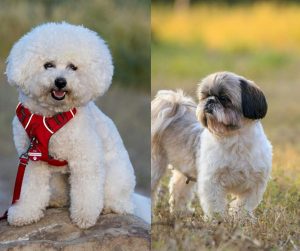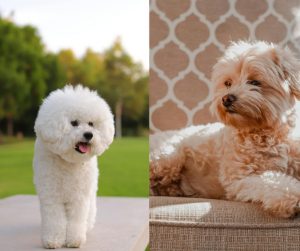When choosing between a Bichon Frise and a Toy Poodle, potential pet owners will find themselves comparing two of the most charming and popular small dog breeds.
Both breeds share a history of European descent and come from a lineage of ancient water dogs, showcasing their rich heritage and esteemed place in society. These breeds are admired for their intelligence and affectionate nature, which make them excellent companions. They both possess a hypoallergenic curly coat, which is a significant advantage for families with allergies.
Despite their similarities, there are distinct differences that set them apart.
The Bichon Frise tends to have a playful and happy demeanor, always ready for a game or an adventure with their beloved humans. Alternatively, the Toy Poodle is renowned for its intelligence, elegance, and agility, often considered one of the smartest of all canine breeds.
When it comes to size, the Toy Poodle is generally smaller than the Bichon Frise and comes in a wider variety of colors.
These differences, along with varying breed characteristics, health considerations, and care requirements, are important for prospective owners to consider when deciding which breed will best fit into their lives. With that said, let’s take a look at the Bichon Frise vs Toy Poodle dog breed comparison.
Key Takeaways
- Bichon Frises and Toy Poodles are both intelligent, affectionate breeds with hypoallergenic coats but differ in size and color variety
- Their shared ancestry relates to ancient European water dogs, influencing their sociable and trainable characteristics
- Owners should weigh breed specifics, health care, living conditions, and individual dog temperament when choosing between the two
History and Origin
When diving into the histories of the Bichon Frise and Toy Poodle, we’re really peeling back the layers of time to uncover their unique stories. Each breed has traveled a long road from their origins to become the beloved pets they are today.
The Bichon Frise Lineage
The Bichon Frise breed sparkles with a history as cheerful as its demeanor. They trace their ancestry back to the Mediterranean region and are often linked to the Barbet, a larger water spaniel from which they may have descended. Sailors are said to have favored these little white dogs, spreading their popularity across continents.
Eventually, the Bichon Frise found a special place in Spain, where their popularity peaked before they became the darlings of French nobility. Despite their royal connections, it’s the Bichon Frise’s jovial spirit that has captured hearts worldwide.
The Evolution of the Toy Poodle
Contrary to its fancy flair, the Poodle boasts a working-class background, believed to have originated in Germany as a duck hunter. Yet, it’s France where the Poodle truly flourished and where the breed is officially credited. The Poodle comes in three main sizes—Standard Poodle, Miniature Poodle, and Toy. The American Kennel Club recognizes all sizes, but not as a separate breed.
The Toy Poodle was bred down from the larger versions to suit the lifestyles of those desiring a smaller, yet still utterly posh, canine companion. It’s a creative spirit that echoes through each curl and spring of the Toy Poodle’s step.
Bichon Frise vs Toy Poodle Characteristics
When comparing the Bichon Frise to the Toy Poodle, it’s fascinating to see how their charming attributes set them apart, yet they share a lovable nature. They each flaunt distinctive physical features and engaging temperaments that endear them to pet lovers everywhere. Nowadays, a lot of people mistake the Bichon Frise for the Maltese dog breed. But let’s clear the air and talk about distinct physical traits of Toy Poodle dogs and Bichon Frise dogs.
Physical Attributes
Bichon Frise:
- Size: They stand around 9-12 inches tall.
- Weight: The average weight is 12-18 pounds.
- Appearance: They are recognized for their fluffy, white coats which are soft and curly.
Toy Poodle:
- Size: They typically are a bit smaller, standing up to 10 inches
- Weight: Toy Poodles weigh between 4-8 pounds
- Appearance: Their curly coats come in a variety of colors, including black, white, apricot, cream, blue, gray, red, silver, and brown
Temperament and Behavior
Bichon Frise:
- Personality: They’re known for their affectionate and friendly demeanor
- Behavior: Highly playful and energetic, they thrive on interaction and are quite intelligent, making them easy to train
Toy Poodle:
- Personality: Equally intelligent and affectionate, they share a similar zest for life as the Bichon Frise
- Behavior: Toy Poodles are sociable and eager to please, making them equally playful and adaptable companions
Both breeds demonstrate a fondness for their humans, making either a Bichon Frise or Toy Poodle a heartwarming addition to the family. They reflect a joyful spirit that fills a home with love and laughter. Here is as fun fact. If you cannot decide between the two, trying to find a Bichon Poodle mix is always an option. Called Bichon Poo, this miniature mix is quite active.
Health and Care
When it comes to Bichon Frises and Toy Poodles, ensuring their health and optimizing their care are crucial. Both breeds have specific health concerns to watch for, and their grooming needs share similarities due to their similar coats.
Common Health Concerns
Bichon Frises
- Hip Dysplasia: A malformation of the hip joint that can cause pain and arthritis
- Patellar Luxation: Knee caps that may slip out of place, which can be uncomfortable
- Allergies: They can develop skin allergies and may require special care
- Dental Issues: Their small mouths can lead to overcrowding of teeth and other dental problems
Toy Poodles
- Epilepsy: This breed can be prone to seizures, which require management by a veterinarian
- Progressive Retinal Atrophy: An eye condition that can progress to blindness
- Patellar Luxation: Similar to Bichon Frises, their kneecaps may also slip out of place
- Ear Infections: Due to deep ear canals, they’re susceptible to ear infections, which should be checked regularly
Both breeds benefit from routine veterinary check-ups to manage these health issues and prevent them whenever possible. A balanced diet and regular exercise are key to maintaining their overall well-being.
Grooming and Maintenance
Grooming Needs Both the Bichon Frise and Toy Poodle have curly, soft coats that are hypoallergenic and shed minimally. However, they do require:
- Regular Brushing: Several times a week to prevent matting and tangles
- Professional Grooming: Every 4 to 6 weeks to keep their coats healthy and manageable
Exercise and Energy Level
- Bichon Frises and Toy Poodles are both lively with a moderate to high energy level. Daily walks and playtimes are essential to keep them happy and prevent boredom
Nutrition A diet tailored to their life stage and size is important. Both breeds may be prone to bloat, so they should have small, frequent meals rather than large ones.
Bichon Frise vs Toy Poodle Training and Behavior
Training a dog is an important part of pet ownership, and when it comes to the Bichon Frise vs Toy Poodle, dog owners can look forward to an enjoyable experience due to their intelligence. While both breeds are renowned for their trainability, their behaviors differ in nuances that a dog owner should anticipate.
Obedience and Training
The Bichon Frise and Toy Poodle share a reputation for being highly trainable and intelligent. Training these breeds often proves to be a rewarding task because they are eager to please their owners and catch on quickly.
However, these pups do have their differences:
- Bichon Frise: Sensitivity is a key trait of the Bichon. They respond best to positive reinforcement and gentle dog training methods. Due to their need for attention, they may develop separation anxiety if left alone for too long. Consistent, patient training is crucial to helping them thrive
- Toy Poodles: Known for their exceptional intelligence, Toy Poodles rank high in trainability. They excel in obedience due to their attentive nature. However, they may surprise their owners by being small but fierce watchdogs, potentially leading to excessive barking if they aren’t taught to moderate their vigilance
Socialization and Mental Stimulation
Both popular dog breeds are social butterflies, and if one thing’s for sure, they love being the center of attention.
- Bichon Frise
- Highly sociable with both humans and other dogs
- Mental stimulation can be met with interactive play and training games
- Without proper socialization, they can become timid or shy
- Toy Poodle
- Very attentive, enjoying mental challenges and advanced training exercises
- Benefits greatly from early socialization with environments, people, and pets
- Prone to boredom and potentially destructive behavior if not mentally stimulated
Living Conditions
Bichon Frise dogs and Toy Poodles are both affectionate breeds that thrive on human companionship. They’re adaptable, joyous little dogs that make fantastic family pets. Their manageable sizes mean they are well-suited for various living situations.
Adaptability to Home Environments
Bichon Frise dogs and Toy Poodle dogs can adjust brilliantly to life in an apartment. They both don’t require a yard and can be content living in smaller spaces as long as their need for companionship is met.
They fit easily into the family dynamic, making great companions for children as well as adults. Their love for companionship means they’re happiest when they can share in the family’s daily activities.
- Bichon Frise: Adapts well, but daily interaction is a must
- Toy Poodle: Petite and quiet, apartment-friendly
Pro Tip: For peaceful coexistence with neighbors, it’s wise to invest in training to minimize barking.
Exercise and Activity Needs
Neither the Bichon Frise nor the Toy Poodle is a high-energy breed, but they both require daily exercise to stay healthy and happy.
The right amount of activity curbs potential behavior issues and keeps them mentally stimulated.
- Bichon Frise: A brisk walk and playtime suffice
- Toy Poodle: Enjoys stimulating games and maybe even a swim
Both breeds are clever and can learn to enjoy a range of activities; they love to play and appreciate having toys.
Short, fun play sessions with their human or pet siblings can fulfill their exercise needs and strengthen the bonds of companionship.
Breed Comparisons
When looking at the Bichon Frise and the Toy Poodle, they may share a family resemblance with their curly coats and bright eyes, but there are distinct features that set them apart. Let’s dive into what they have in common and what makes each breed unique.
Similarities Between Breeds
Both the Bichon Frise and the Toy Poodle have a lot in common. They are renowned for their curly hypoallergenic coats which make them a top pick for families with allergies. Here are some key similarities:
- Height and Weight: On average, both breeds stand between 9-15 inches tall and weigh around 12-18 pounds
- Intelligence: They are incredibly bright and easily trainable, which makes them ideal pets for families and single owners alike
- Lifespan: These breeds typically enjoy a long and healthy life, often ranging from 12 to 15 years
Distinct Differences
Despite the similarities, the Bichon Frise and the Toy Poodle have their own distinctive traits:
- Size Variations: While the Bichon Frise comes in one size, the Poodle breed offers more variety with toy, miniature, and standard sizes
- Energy Levels: Typically, Toy Poodles have a bit more energy and may require more exercise than a Bichon Frise
- Maintenance: They both need regular grooming due to their coats, but the Bichon Frise generally requires less maintenance compared to the Toy Poodle
Ownership Considerations
When comparing the Bichon Frise and Toy Poodle, prospective pet owners should weigh the costs and personal lifestyle to ensure they make an informed decision that’s best tailored to their life and the well-being of their future canine friend.
The Cost of Ownership
Initial Costs: When bringing a new puppy home, the initial price tag can vary significantly between a Bichon Frise and a Toy Poodle.
Generally, one may find that Toy Poodles are more expensive due to their popularity and the range of sizes and colors they come in. On the other hand, Bichon Frises can be more affordable. Here’s a quick breakdown:
- Bichon Frise: $500 – $2,500
- Toy Poodle: $1,000 – $3,000
Care Costs: Considering the long run, both breeds have a comparable life expectancy of 12-15 years, which means a long-term commitment to various expenses such as food, grooming, and veterinary care.
Health-wise, Toy Poodles may require more attention as they are prone to conditions like hip dysplasia and epilepsy, while Bichon Frises can face issues like bladder stones and skin allergies.
Grooming Needs: Both breeds are known for their hypoallergenic coats, which is a blessing for owners with allergies. However, they do require regular grooming to prevent matting and maintain their fluffy appearance – something to factor into ongoing costs.
Making the Right Choice
Lifestyle Fit: The Bichon Frise and Toy Poodle are both excellent companion dogs, known for their loving and outgoing personalities.
However, they do differ in their activity needs.
If one enjoys agility training or more active pursuits, Toy Poodles tend to excel in these areas with their intelligent and energetic nature.
If one prefers a more laid-back companion, the Bichon Frise, with its cheerful and affectionate demeanor, may be more their speed.
Compatibility with Other Breeds: Bichon Frises and Toy Poodles often get along well with other companion breeds like the Maltese, Havanese, or Bolognese, but introducing them into a household with existing pets requires patience and proper socialization.
Choosing between a Bichon Frise and a Toy Poodle is more than just a matter of breed comparison; it’s about finding the right fit for one’s lifestyle and budget.
By considering these points carefully, an owner is on the right path to finding a loving and compatible furry friend.

